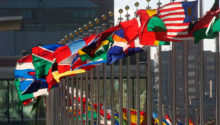Stephen Toope
The United Nations. The World Trade Organization. UNICEF. NATO. The World Health Organization. The World Bank and International Monetary Fund. The UN High Commission for Refugees. Governments. Schools. Police and courts. Corporations. NGOs.
I have noted a worrying trend toward writing these and other such institutions off as outdated, irrelevant, not to be trusted. The media make hay when politicians break promises. Citizens demand greater transparency. NGOs are criticized for excessive overhead; schools for talking more about budgets than about students. Police are caught on camera brutalizing suspects. Companies move quickly to lay off loyal employees when profits sag.
There’s a growing sense that the vehicles for international cooperation created after the Second World War to maintain peace and security, nurture social and economic development, and promote human rights are coming up short. There’s impatience with ponderous decision-making and decisions that are perceived to favour “others” over “us.” There’s anger over income inequality, tension over armed conflict.
Populist politics is on the rise. In a world in which social change can be sparked through Twitter and Facebook – when liking a story or crowdfunding on your phone is so easy – why the need for such expensive and old-fashioned bureaucracy?
I believe that institutions have a critical role to play in our interconnected world. If they were abolished tomorrow, we’d have to reinvent them. While I strongly encourage citizens to use social media to better understand the world and engage in changing it for the better, this is not sufficient. Institutions offer a level of stability, predictability and capacity to deliver social services. We need this sustaining structure to tackle complex issues for the long term.
All institutions have flaws. We need to reform them, not abandon them. For the most part, they are managed by people who are truly committed to their mission and who constantly struggle to balance diverse and often conflicting interests. Employees do their best to deal with complexity and ambiguity. Inevitably, mistakes are made. Compromises are negotiated; some people are pleased and others unhappy.
The US administration has signalled a lack of appetite for maintaining its traditional role as the major guarantor of the post-war international organizations and talks of considerable reductions in support. Other wealthy countries will need to step up to fill the gap. I believe Canada should be thinking about where we can make the greatest contribution. Perhaps as political backer of the High Commission for Refugees, maybe in partnership with Germany? Maybe we join with Japan and Korea, possibly the UK, in revitalizing the World Trade Organization?
It will take political will, public support – and more people excited about and equipped to take on these challenges. Through the Master of Global Affairs summer internship program, the Munk School offers students opportunities to appreciate and participate in the work of diverse institutions around the world and here at home. They’ve been placed in NGOs, corporations, governments, academic institutes as well as major international organizations such as the UN and the WHO. We also create projects that bring together experts from multiple countries to focus on areas where institutions are failing society. The Inside Justice Project, for example, is examining how justice officials in Africa and Latin America learn through experimentation – from reforms to police complaint systems in Nigeria, to investigations of homicide led by prosecutors in Colombia, and gang-violence strategies in Honduras.
Successful societies thrive with strong institutions and decay without them. Let’s celebrate those we have, even as we work on necessary reform.
March 6, 2017
